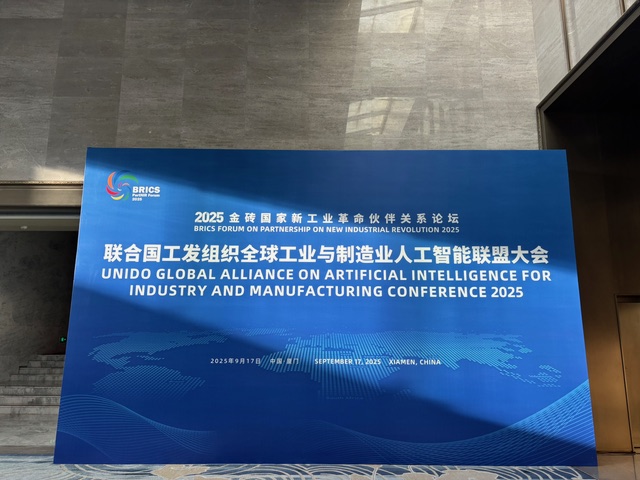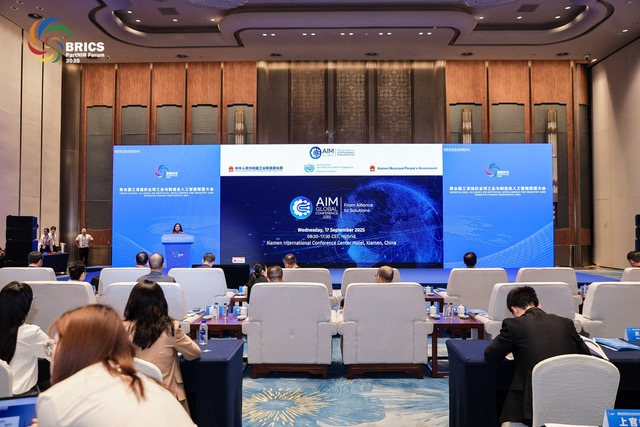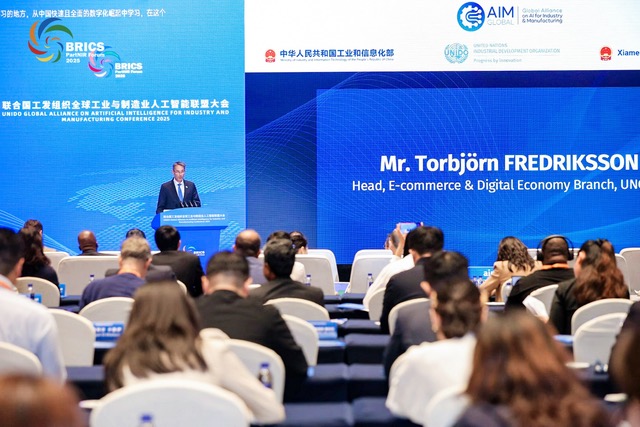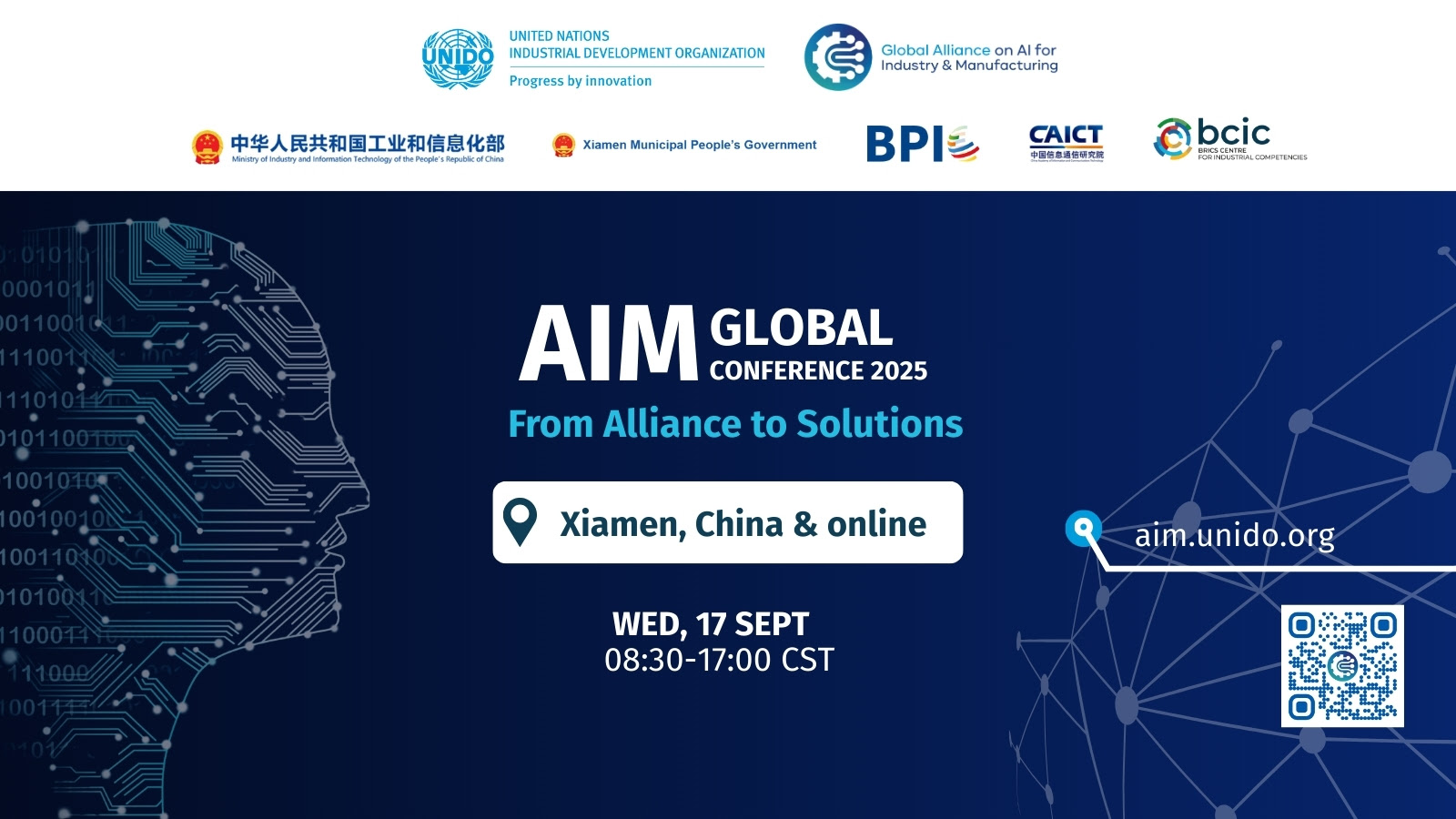Overview
The AI for Industry and Manufacturing Conference 2025, held on September 17, 2025, at the Xiamen International Conference Center Hotel, was a pivotal event under the theme “Artificial Intelligence for an Inclusive Digital Economy and Smart Manufacturing”.
Co-hosted by the United Nations Industrial Development Organization (UNIDO), China’s Ministry of Industry and Information Technology (MIIT), and Xiamen Municipal People’s Government, the hybrid conference aligned with the BRICS Forum on Partnership on New Industrial Revolution 2025.
It drew approximately 500 participants from over 20 countries, including Brazil, Cuba, the Republic of the Congo, Ethiopia, and Vietnam, comprising government officials, UN representatives, industry leaders, and academics.
The event advanced the Global Alliance on Artificial Intelligence for Industry and Manufacturing (AIM Global) into Phase II, emphasizing actionable solutions, inclusive digital economies, and sustainable industrial transformation, with outcomes feeding into UNIDO’s 2025–2026 workplan and the 21st UNIDO General Conference in Riyadh, November 2025.


Key Objectives and Outcomes
The conference achieved its objectives through a mix of high-level discussions, launches, and practical demonstrations:
- Launch of AIM Global Phase II: Introduced the strategic evolution of AIM Global, including the establishment of the AIM Global Trust Fund, a High-level Advisory Committee, thematic pillars, and regional chapters, shifting focus from alliance-building to solution implementation.
- Showcase of Lighthouse AI Solutions: Demonstrated scalable AI applications (e.g., predictive maintenance, energy efficiency) for SMEs and green manufacturing, presented by companies like Huawei, UCloud, Siemens, EY, and Quantaeye.
- Partnerships and Matchmaking: Welcomed new AIM members (e.g., SAP China, UCloud, Conch Cement) and facilitated structured B2B/B2G matchmaking via the AIM Community Platform, fostering global collaboration.
- Youth and Skills Development: Engaged young professionals and students, particularly from Xiamen University, in a dedicated workshop to inspire next-gen AI innovation, emphasizing gender and geographic inclusivity.
- Policy and Research Contributions: Released key reports, including the Shanghai AI Research Institute’s Intelligent Manufacturing, International Cooperation, and Development Report and Beijing Institute of Technology’s AIM Green Index, shaping global AI governance.
The conference solidified international consensus on AI as a driver for inclusive industrial growth, addressing digital divides and aligning with the Global Digital Compact. Outcomes included UNIDO’s draft Call-to-Action 2025 and a strengthened foundation for global AI governance.

Torbjörn Fredriksson, Head of the ICT Policy Section at UNCTAD, during the “AI and Digital Skills” presentation
Agenda and Speaker Highlights
The agenda blended live-streamed and in-person sessions, with ~40 speakers contributing expertise:
- Opening and Launches (08:30–10:40):
- Welcome Address: Zou Ciyong (UNIDO Deputy to Director-General) set the tone for AI-driven transformation. Xin Guobin (MIIT Vice Minister), Fujian provincial leaders, Amandeep Singh Gill (UN Tech Envoy, via video), and Tomas Lamanauskas (ITU Deputy Secretary-General) highlighted AI’s potential for economic growth and SDGs.
- Phase II Launch: Jason Slater (UNIDO Chief AI Officer) unveiled the AIM Global Trust Fund and implementation mechanisms, emphasizing “AI as a driver, not a divider.”
- Key Releases: Cooperation agreements with Xiamen University and Beijing Institute of Technology were signed, and the BRICS AI Innovation Platform was launched.
- Thematic Discussions (10:55–12:40):
- AI and Digital Skills: Explored capacity building, with insights from UNCTAD’s Torbjörn Fredriksson and UNITAR’s Grace Gao Ling.
- Inclusive Digital Economy: Léon Juste Ibombo (Congo Minister) and Elizabeth Pei (SAP) discussed AI for SMEs and developing regions.
- BRICS Cooperation: Yonas Mekuria (Ethiopia) and Wei Liang (China-BRICS AI Centre) highlighted South-South AI scaling.
- AI Solutions and Youth (13:30–15:20):
- Rapid-Fire Solutions: Huawei’s Bo Meng, UCloud’s yijin zhao, Siemens, EY’s Lai Fan, and Quantaeye’s Sun Changku showcased real-world AI tools.
- Youth Workshop: Wang Bencong (Beijing Institute of Technology) and Xiamen University students pitched innovative AI concepts.
- Closing (15:20–15:30): Zou Ciyong summarized outcomes, linking to UNIDO’s Call-to-Action 2025 and ongoing AIM collaboration.
The news release underscores the conference’s global impact:
- High-Level Engagement: Speeches by Amandeep Singh Gill and Fujian leaders reinforced AI’s role in sustainable development, complementing Zou Ciyong and Xin Guobin’s focus on industrial transformation.
- Strategic Upgrades: The AIM Global Trust Fund and regional chapters, as announced by Jason Slater, mark a shift to operational solutions, with new members like SAP China and Conch Cement enhancing industry buy-in.
- Research Outputs: The AIM Green Index and Shanghai AI Research Institute’s report provide actionable frameworks for WFEO’s AI governance work.
- BRICS Synergies: The BRICS AI Innovation Platform strengthens South-South collaboration, aligning with speakers like Tiago Pinto de Almeida (BRICS PartNIR).
Report by Li Pan, Executive Director of the AI & Big Data Working Group of the WFEO Committee on Engineering for Innovative Technologies (CEIT)
SEP
2025

